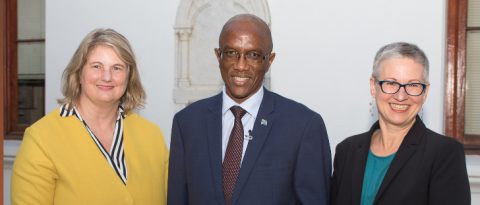Human Rights Day
Wasting Of Public Money Threatens Our Democracy – AG
The wasting of large sums of public money and a lack of consequences for bad behaviour ultimately lead to civil action such as widespread protests over government’s broken promises, said Kimi Makwetu, Auditor-General (AG) of South Africa, on Thursday (29 August 2019). He delivered the annual Human Rights Lecture of the Faculty of Law at Stellenbosch University (SU). The event was hosted by the HF Oppenheimer Chair for Human Rights Law.

In his speech, Makwetu said the auditing of government and public sector entities showed that since the 2008–09 financial year, irregular expenditure had increased dramatically reaching R390 billion over the 10-year period.
“During that period, irregular expenditure increased seven-fold at local government level from R3 billion in 2008–09 to R21 billion in 2017–18, while at the national and provincial government level irregular expenditure increased 50-fold from R1 billion in 2008–09 to R51 billion in 2017–18.”
He also pointed out that the portion of national and provincial government auditees with clean audits was hovering around just 30%, while this indicator was barely 15–20% for the municipalities.
Makwetu said poor audit outcomes that were indicative of accountability failures, if sustained over a number of years, would manifest in service delivery challenges, deteriorating financial health and governance failures.
“All these combined, hit the economy very hard – small businesses go bankrupt, poverty increases and employment figures nosedive. This will ultimately be evident to the outside world, as already evident in economic downgrades and lack of investment – matters that can bring a democracy, and all its related promises to its citizens, to naught.”

According to Makwetu, the inaction, or inconsistent action, of our leaders, created a culture of “no consequences”, often due to inadequate performance systems and processes.
“Vacancies and instability in key positions slowed down systematic and disciplined improvements and resulted in insufficient implementation and maintenance of financial and performance management systems by the administration.
“A disregard for controls (including good record keeping) and compliance with key legislation in various parts of the public sector enabled an environment in which it would be easy to commit fraud. Political infighting and interference in the administration led to weakened oversight and poor to no implementation of consequences for transgressions.”
Makwetu said the AG was mandated to report on government’s accountability for the use of public resources, with specific emphasis on financial management, performance management and respect for the law.
“Over time, especially given certain failures in the system of accountability, this reporting also started focusing on government’s inability to effect consequences for these failures.”
He added that public sector auditing was an important factor in making a difference to the lives of citizens and had a positive impact on trust in society because it focused the minds of the custodians of public resources on how well they use those resources.
“An independent, effective and credible audit office is therefore an essential component in a democratic system where accountability, transparency and integrity are indispensable parts.”
Makwetu said he would like to see an improvement in the ethical behaviour of those in the public sector and a visible commitment by all public servants to contribute towards the financial health of the country and a better social reality for all South Africans.
Auditor-General Affirms Accountability In SU Visit
 At the 2019 Annual Human Rights Lecture hosted by the Stellenbosch University (SU) Faculty of Law, the Auditor-General of South Africa, Mr Thebekile Kimi Makwetu, gave his views on public accountability.
At the 2019 Annual Human Rights Lecture hosted by the Stellenbosch University (SU) Faculty of Law, the Auditor-General of South Africa, Mr Thebekile Kimi Makwetu, gave his views on public accountability.
The lecture — presented by HF Oppenheimer Chair in Human Rights Law, Professor Sandra Liebenberg, and Vice Dean of the SU Faculty of Law, Professor Richard Stevens — focused on constitutional protections of public resources and the role of the Auditor-General.
Attending the lecture were several SU deans and departmental heads, officials from the Stellenbosch Local Municipality, as well as former Public Protector, Professor Thuli Madonsela.
“The office of the Auditor-General is the constitutional guardian of public resources in South Africa,” Liebenberg said while she introduced Makwetu.





